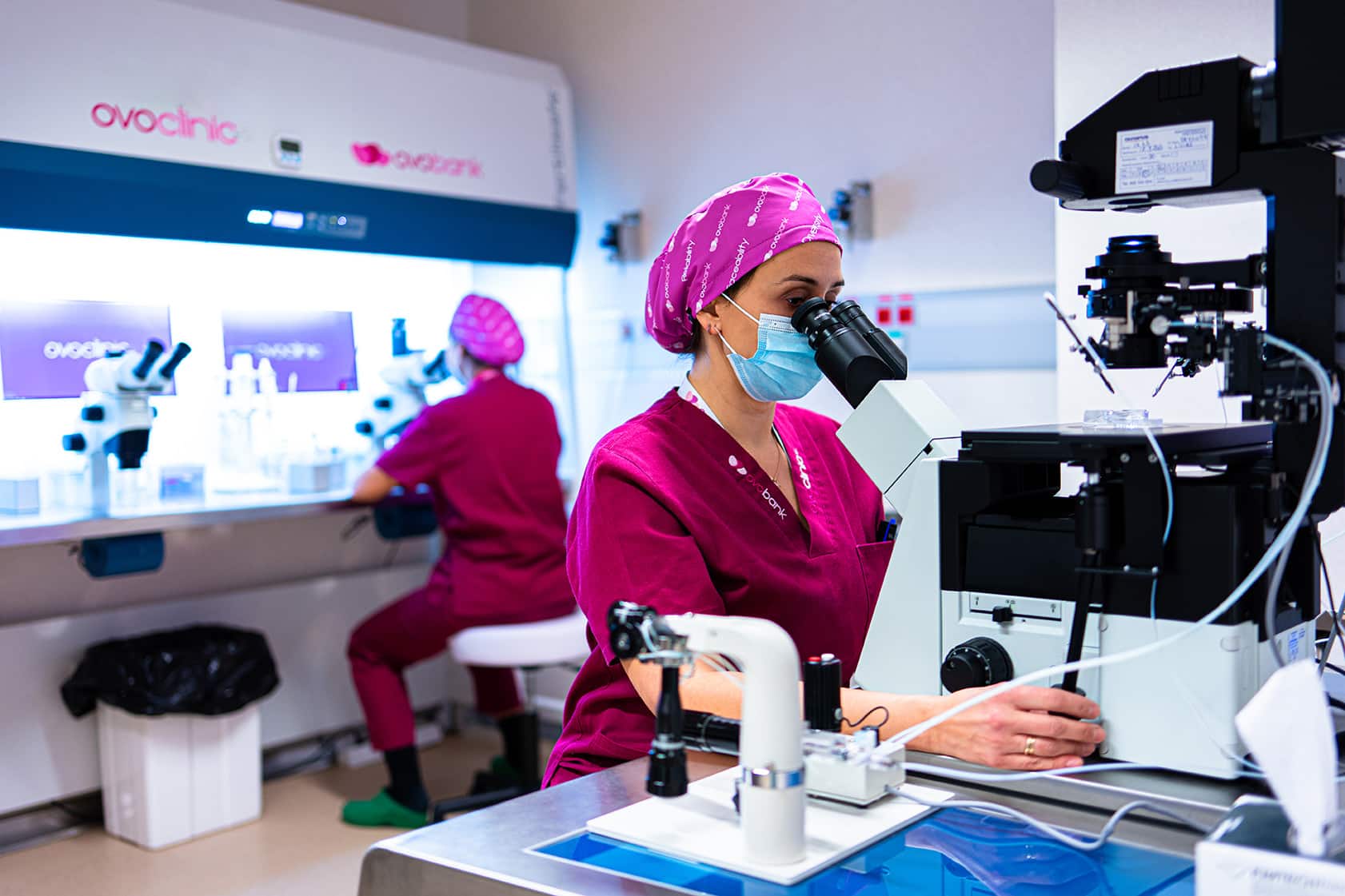
Donor Conception
Egg donor profiles – what you’ll see & how to navigate
Eloise Edington | 19 Aug 2022
Words by Jessie Day
For many intended parents we speak to, the more information, the better. You’ve almost definitely been on a journey already. The last thing you want is another step which feels outside of your control. Egg donor profiles – what you’ll see, and the navigation – should be clearly set out, empowering your TTC journey.
Choosing may be daunting – it’s a pivotal step, after all – but you should always have clarity, and access to support.
Fertech is changing egg donation
From preimplantation genetic testing to immunologic matching, fertility technology – fertech – is transforming egg donation. The process and experience, for donors and intended parents, is barely recognisable, when you look at early egg donation advances in the 1980s.
This is hardly surprising – you’d hope it would have moved on, somewhat! – but the technology available to clinics and the TTC community in 2022 is game-changing. For Ovobank ID, one of the most exciting areas is database, trace and matching technology. As Europe’s first ever donor egg bank, they know a thing or two about precision matching, and egg transport logistics. But a new crop of tools are taking things to the next level.

The details you may get, and why
Today, we’re focusing on egg donor profiles – what you’ll see (typically) when selecting your donor, and how to navigate this step in your journey. We’ve rounded up the key elements to prep for. Looking to optimise? Ask your clinic about the tools Ovobank ID provide. From facial recognition matching technology with Ovomatch, to ovobankid.com – their customised, safe matching system – plus pioneering tracing system Ovotracker (designed for clinics), this is advanced egg donation, at its most precision-perfect.
Facial recognition matching tech, with Ovomatch
Ovomatch is Ovobank ID’s cutting-edge facial recognition app. This amazing tech allows patients to see the total number of phenotypically matched donors, through a simple selfie. The final matching is done by a specialised team, who will analyse, among many aspects, blood groups and features, to match patients with their most similar, or ideal, donor.
1. Physical appearance
From Ovobank ID’s state-of-the-art facial recognition technology, to a few details about hair and eye colour, this is an important criteria choice to prepare for, if you haven’t already. Many intended parents opt for a donor who shares key physical traits. It’s personal preference and for some, not a consideration. But you’ll probably see details around height, weight, hair colour and eye colour.
Remember, physical appearance is unique to every individual. Hair and eye colour aren’t necessarily passed down, and genetics are complex.

2. Ethnicity
Ethnicity and heritage are top priorities for many intended parents. This may be because you have specific shared origins, and cultural references, which are important to you. But bear in mind, certain ethnic groups are sadly underrepresented in egg donation pools right now. Your clinic or egg bank should work with you to find an egg donor who matches your requirements. Talk to your team and see what’s possible, or get to know a larger egg bank – Ovobank ID have access to thousands of donors – who may provide broader options.
3. Interests, education & work etc
Of course, there are no guarantees around this. But it’s an interesting detail for lots of intended parents. If you’re really into sport, for example, it may just be nice to know that so is your donor. And that possibly, that personality trait may get passed down. Similarly with careers and chosen profession – you might even go for someone who’s taken a very different path in their career or education, to you.
4. A personal message
Some egg banks provide this, or encourage donors to write a few lines. It will usually be a personal message to you, wishing you success in your journey to parenthood. It may also contain a few words for your baby, and may go into their decision to donate their eggs.
Everyone is different. And a personal message from your donor can be a comfort, but it can also be tricky to navigate – even triggering. The FHH team and community are here to support with the emotions which may come up – DM us on Insta or join our online tribe, to share with people who get it.

5. Blood type
Less emotionally charged, let’s touch on blood type. From O+ to B-, blood type is important to some intended parents, if trying to ‘match’ with their baby in the future. Parents may want the option to donate blood, if their child needed it, for example.
Alongside this, some intended parents don’t wish to reveal their children’s genetic origins. Having the same blood type can give an element of privacy, but with direct-to-consumer DNA tests now widely available, this is becoming less relevant.
Bear in mind, your baby only inherits one ABO gene from its egg and sperm source, so there are very few guarantees around blood type.
6. Age
The range varies between banks. But generally speaking, donors will be aged between 18 and the early 30s. At Ovobank ID, all donors are aged 18-33.
Age is one of the most important criteria for banks when recruiting donors, to ensure optimum egg quality and count. By having a strict range in place, well-within the prime fertility years, they can optimise for healthy pregnancy success rates.
7. Health history
Egg donors will go through a highly detailed screening programme, before beginning their retrieval process. This usually involves medical, genetic and psychological assessments, and any serious inheritable conditions will trigger disqualification.
If a woman’s condition is mild or there isn’t a proven genetic risk, she may still qualify to become a donor. Your bank should always disclose this to you.
Choosing an egg donor – 5 FAQs with Ovobank ID
Time for your questions. What does the TTC community want to know about egg donation right now? And, as Europe’s very first egg bank, where do Ovobank ID stand on selection, blood type, matching and shipment?
Q. How do you select an egg donor?
At Ovobank ID, our coordination department will help match you with an egg donor who best-meets your criteria. We factor in all of the elements above, from physical appearance preferences to blood type, and also immunological/phenotypical compatibility. We’ll then send you our proposal, and your clinic will receive oocytes 24-48 hours later (in the case of vitrified (frozen) oocytes).
Q. Does blood type matter, with donor eggs?
Medically speaking, your donor’s blood type doesn’t affect your chances of pregnancy. But blood type is important to many intended parents – see no 5 above for why this might be.
Q. How are donors matched?
We try to provide options to meet all sorts of situations, and requirements. With Ovobank ID, you can:
- use our shared platform Ovotracker, where your medical team can help you choose directly from a list of egg donor profiles
- match with our donors independently online at www.ovobankid.com, or using Ovomatch – our cutting-edge facial recognition matching app
Q. How do you select the best quality oocytes?
Our embryologists only select oocytes in metaphase II (MII), so that they’re able to undergo meiotic maturation, fertilization, proper embryonic development and, ultimately, lead to a successful pregnancy. After thawing, we carefully review the morphology of the oocyte. Our embryologists run analysis for morphological anomalies, assessing whether any of these may interfere with their quality.
Q. How can you ensure safe shipment?
We ship every oocyte batch in a state-of-the-art cryo container. Your oocytes are classified through an amazing system of medical straws and goblets, which allow safe transfer. This process allows seamless batch identification, without compromising on temperature conditions.
The cryo containers themselves are protected inside reinforced aluminium boxes, designed to avoid any slight damage during transport. Our shipping is extremely quick, and your oocytes can arrive at your clinic within 24 hours if necessary.

Ovobank ID has now landed in the UK and Ireland. Take a look, and when you’re ready, find a donor and order oocytes online using their state-of-the-art matching and logistics technology.


